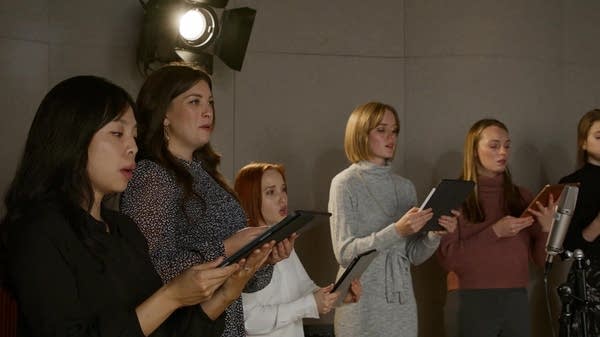Editor's note: The Minnesota Orchestra interrupted a decades-long tradition last year by not performing Handel's Messiah. Instead, with renowned conductor Helmuth Rilling and the Minnesota Chorale, the orchestra presented J.S. Bach's Christmas Oratorio.
Tune in for a special encore broadcast of last year's Christmas Oratorio, with Cantata Nos. 1, 2 and 3, at noon Sunday, followed by a live broadcast of Cantata Nos. 4, 5 and 6 at 2 p.m., under the direction of Nicholas Kraemer. Brian Newhouse hosts.
Conductor and harpsichordist Nicholas Kraemer, who leads the Minnesota Orchestra this weekend in performances of works by Bach, became a professional musician by accident.
"The harpsichord thing? Well, it came by mistake in the sense that I was a keyboard player and I was involved in opera as a student at college and there was a harpsichord there," he says. "So I got to use it, and I rather liked it. I bought one, a small one, and started practicing, and that then just carried on: me playing continuo in orchestras.
"The conducting thing was also not anything that I was aiming for. It just happened that people in small groups would say, 'Oh, just start this one off, would you?' And so I'd start it off; I'd raise my arms. And then before you know where you are, you're a conductor!"
Over the decades, Kraemer has appeared with a wide variety of ensembles in Europe and the United States, performing repertoire ranging from Monteverdi to modern composers. But he clearly has an affinity for Baroque music and Bach, in particular.
Given that specialty, what's it like leading a modern symphony orchestra that doesn't necessarily specialize in the performance of Baroque music?
He's blunt: "Well, I can tell you, it used to be very, very hard. But it isn't anymore! Orchestras have become much more sophisticated. If you mentioned vibrato to an orchestra, they used to roll their eyes. Well, they don't anymore. In fact, very often I come to a symphony orchestra for the first time and we do some Baroque music and they don't play it with any vibrato at all. And I say, 'Hey guys, we need a little bit of vibrato here; it's just not sounding very good!'" He laughs. "So, you know, sometimes they overprepare in that way."
This weekend the program begins with Bach's Third Orchestral Suite, but the meat of the program is Bach's Fourth, Fifth and Sixth Christmas Cantatas.

"We're only doing three cantatas, which I find a bit of a shame," Kraemer confesses. "I'd always like to do more!"
But even just those three cantatas have a lot going on.
"There's juicy texts," he says. "You just wouldn't believe it. I mean, it's rather blandly called the Christmas Oratorio. And, of course, there's a lot of references to the Nativity, and there's an evangelist who tells the story like in the Passions. But the imagery that Bach has conjured up in these cantatas is quite extraordinary."
In fact, Kraemer believes the imagery in the texts can provide valuable musical clues — insights that he hopes will, in some respects, lead to a potentially unorthodox interpretation.
"Looking at the beginning of the last cantata with the trumpet. … We think of that as a very uplifting piece of choral music. But when you hear what the words are — 'When the proud enemy snorts, help us to keep steady' — it's quite difficult to sing the word 'schnauben' to make it sound like a snort, but I'm going to do my damnedest to get the chorus to sing it that way, because that's what it is. It's always done in a very forthright way, but I'm thinking it has to be more than that.
"And then there's mention in the same chorus of 'the sharp claws of the enemy.' We're talking here about a Hieronymus Bosch picture of hell. You've just got to imagine these griffins or whatever you'd like in front of your eyes, and it has to sound like that; it has to be performed like that. So, you know, I've only got three days to prepare it, but I'm going to do my best!"
In the end, what seems to animate Kraemer the most about the music of Bach is its fabulous, fathomless, thrilling versatility.
"There are so many different ways of doing, for instance, the opening of the Fifth Cantata. It can go along in a sort of easy gait, and it'll still have the idea of 'Glory to God.' But if you do it really fast — as fast as the chorus can sing it — it's going to sweep you off your feet and, well, I hope it sweeps everybody, including me!"
His life in music may have begun by accident, but judging by his boundless enthusiasm, Kraemer found exactly where he belonged.
Resources
Personnel
Minnesota Orchestra
Nicholas Kraemer, conductor
Sherezade Panthaki, soprano
Robin Blaze, countertenor
David Portillo, tenor
Christopher Edwards, baritone
Minnesota Chorale
Program
J.S. Bach: Orchestral Suite No. 3
J.S. Bach: Christmas Oratorio — Cantata Nos. 4, 5 and 6
External links
Minnesota Orchestra: A Christmas Oratorio
Bach's Christmas Oratorio (Wikipedia)
Love the music?
Show your support by making a gift to YourClassical.
Each day, we’re here for you with thoughtful streams that set the tone for your day – not to mention the stories and programs that inspire you to new discovery and help you explore the music you love.
YourClassical is available for free, because we are listener-supported public media. Take a moment to make your gift today.










